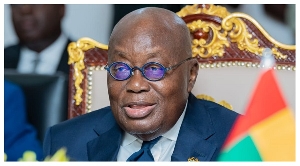Politics of Friday, 23 March 2012
Source: GNA
IEA sets up Political Parties Code of Conduct enforcement bodies
The Institute of Economic Affairs (IEA) has set Monday, March 26 for the inauguration of national enforcement bodies to monitor strict adherence to Election 2012 Political Parties’ Code of Conduct.
According to the IEA, the enforcement bodies will awaken the political parties to the fact that their electioneering activities are being monitored and any party that would violate the Code will be tagged as a “violent party,” and named and shamed in the newspapers or on the air waves.
The IEA will also inaugurate four regional bodies at Koforidua for Eastern, Greater Accra and Volta Regions on Wednesday, March 28; Kumasi for Ashanti and Brong Ahafo Regions on Thursday, March 29; Takoradi for Western and Central Regions on Monday, April 2; and Tamale for Northern, Upper East and West Regions on Wednesday, April 4.
Mrs Jean Mensa, IEA Executive Director who spoke with the Ghana News Agency in an interview explained that the absence of an enforcement mechanism to ensure adherence to the code since 2000, had resulted in non- compliance.
She said in this regard, the previous code had sometimes been described as “toothless bulldog,” adding that the establishment of the enforcement bodies at the national and regional levels was therefore, to give “teeth” to the Election 2012 Code of Conduct.
Mrs Mensa noted that the enforcement bodies have been mandated to monitor the conduct of the political parties and their supporters to ensure they behave in a manner that is expected of them as enshrined in the code.
The bodies will also educate the electorate and supporters of the political parties on the provisions of the Code of Conduct.
The Code of Conduct for political parties 2012 sets out guidelines by which the parties and their supporters agree to be bound by set rules in the course of their campaign and electioneering.
It covers a broad range of matters including abuse of incumbency, defacing of posters, biased media reporting and campaign violence.
The national enforcement body will be chaired by Most Reverend Professor Emmanuel Asante, Chairman of National Peace Council and includes representatives from National Commission on Civic Education (NCCE), Electoral Commission (EC), Ghana Journalists Association (GJA), the security services and political parties.
It will be required to investigate all reports received from the regions and sanction those in breach of the code. The body will publish the findings of its investigations and where necessary, alert the security agencies and other appropriate State institutions for further action to be taken.
The mandate of the regional enforcement bodies are to hold monthly meetings to discuss issues pertaining to any breaches of conduct; travel round the region to monitor the campaigns, rallies and other activities of the political parties.
In addition, they will investigate allegations at the regional level, prepare reports and submit them to the national enforcement body.
Members of the regional enforcement agencies includes regional directors of NCCE; regional directors of EC; regional police commanders; representatives of Catholic Churches in the regions, ; regional political parties; regional peace councils and regional security co-ordinators.
It is expected that having these enforcement bodies at all levels will awaken the political parties to the fact that their electioneering activities are being monitored.**










